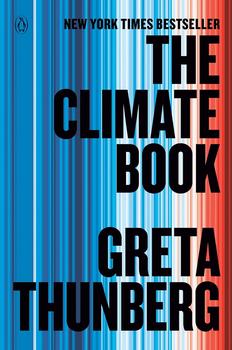Summary | Excerpt | Reviews | Beyond the Book | Readalikes | Genres & Themes | Author Bio

The Facts and the Solutions
by Greta Thunberg
The richest 1 per cent of the world's population are responsible for more than twice as much carbon pollution as the people who make up the poorest half of humanity.
Perhaps, if you are one of the 19 million US citizens or the 4 million citizens of China who belong to that top 1 per cent – along with everyone else who has a net worth of $1,055,337 or more – then hope is perhaps not what you need the most. At least not from an objective perspective.
Of course, we hear, some progress is being made. Some nations and regions report quite astonishing reductions in CO2 emissions – or at least in the years since the world first started negotiating the frameworks for how we manage our statistics. But how do all those reductions hold up once we include our total emissions, rather than carefully managed territorial statistics? In other words, all those emissions that we so successfully negotiated out of these figures. For instance, outsourcing factories to distant parts of the world and negotiating emissions from international aviation and shipping out of our statistics – which means that we not only manufacture our products by using cheap labour and exploiting people, we also erase the associated emissions – emissions that have, in reality, increased. Is that progress?
To stay in line with our international climate targets we need to get our individual per capita emissions down to somewhere around 1 tonne of carbon dioxide a year. In Sweden, that figure currently stands at around 9 tonnes, once you include consumption of imported goods. In the US that figure is 17.1 tonnes, in Canada 15.4 tonnes, in Australia 14.9 tonnes and in China 6.6 tonnes. When you add biogenic emissions – such as emissions from the burning of wood and vegetation – those figures will in many cases be even higher. And in forestry nations such as Sweden and Canada,significantly higher.
Keeping emissions below 1 tonne per person a year will not be a problem for the majority of the world's population, since they will only need to make modest reductions – if any – in order to live inside the planetary boundaries. In many cases, they would even be able to increase their emissions quite substantially.
But the idea that countries such as Germany, Italy, Switzerland,New Zealand, Norway, and so on will be able to achieve such enormous reductions within a couple of decades without major systemic transformations is naive. And still this is what the leaders of the so-called Global North are suggesting will happen. In Part Four of this book we will be looking at how that progress is coming along.
Some people believe that if they were to join the climate movement now, they would be among the last. But that is very far from true. In fact,if you do decide to take action now, you would still be a pioneer. The final part of this book focuses on solutions and things we can actually do to make real difference, from small, individual actions to a planetary system change.
This book is intended to be democratic, because democracy is our best tool to solve this crisis. There may be subtle disagreements between the people writing from the front lines. Each person in this book is speaking from their own point of view and may arrive at different conclusions. However, we need all of their collective wisdom if we are to create the enormous public pressure required to make change. And rather than having one or two 'communication experts' or individual scientists drawing all the conclusions for you as a reader, the idea behind this book is that, taken together, their knowledge in their respective areas of expertise will lead you to a point where you can start to connect the dots yourself. At least, this is my hope. Because I believe the most important conclusions are yet to be drawn – and hopefully they will be drawn by you.
Excerpted from The Climate Book by Greta Thunberg. Copyright © 2023 by Greta Thunberg. All rights reserved. No part of this excerpt may be reproduced or reprinted without permission in writing from the publisher.
Finishing second in the Olympics gets you silver. Finishing second in politics gets you oblivion.
Click Here to find out who said this, as well as discovering other famous literary quotes!
Your guide toexceptional books
BookBrowse seeks out and recommends the best in contemporary fiction and nonfiction—books that not only engage and entertain but also deepen our understanding of ourselves and the world around us.